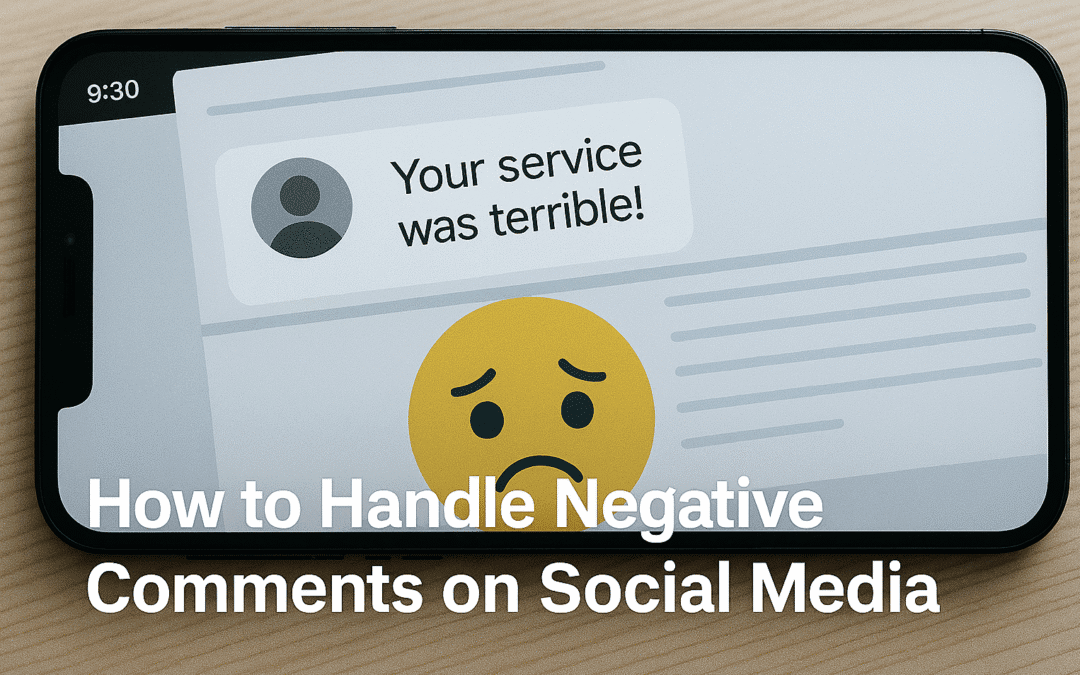Negative comments on social media can feel like a punch to the gut. Whether it’s a ruffled customer posting about a delayed service or someone misinformed about your brand, these remarks don’t just fade into the background. People notice them. What you do next can either help build trust or cause even more damage. Ignoring them isn’t harmless. It often makes things worse.
Handling negative feedback well shows others that your business listens, cares, and acts. But what about comments that are deeply offensive, spammy, or just plain harmful? Do you address them or hit delete? Knowing the difference between helpful criticism and harmful content is key to keeping your online presence respectful and reputable
Understanding The Impact Of Negative Comments
Every comment posted on your social channels shapes how people view your business. When someone scrolls through your feed and sees a thread filled with unresolved complaints or harsh remarks, they start formulating opinions. Even if the original complaint is unfair, your response—or lack of one—speaks volumes.
When negative comments go unanswered, your business may come across as indifferent. On the flip side, reacting emotionally can make things worse. Either way, your brand’s image takes a hit. Creating a straightforward plan to manage these moments helps keep the situation under control.
Here’s what ignoring negative posts can lead to:
– Reputation loss: Harsh remarks, when left unchecked, make your business seem careless or indifferent
– Customer trust: People may hesitate to do business with you if it looks like you don’t address concerns
– Algorithmic reach: Social media platforms tend to promote content that gets a lot of reactions, including negative ones, amplifying the visibility
Take, for instance, a delayed response to a frustrated client’s comment. One unhappy voice quickly draws others, and what started as a one-off issue turns into a comment storm. This makes recovery even harder.
Preventing this starts with setting expectations. Assign staff to check comments regularly. Create rules for what types of comments receive a public response versus those that need to be flagged or hidden. The aim isn’t to shut people down but to keep conversations respectful and productive.
When To Remove Negative Comments
Not every negative comment deserves removal. If you’re too quick to delete, people may think you’re hiding criticism. That can lead to even more distrust. Still, some content crosses a line and doesn’t belong on your page.
These are the kinds of comments that should be removed:
1. Hate speech or discriminatory content: This includes racist, sexist, or otherwise abusive remarks
2. Spam or fake promotions: Comments trying to sell unrelated products or flood your post with irrelevant links should go
3. Personal threats or doxxing: Any comment that contains violent threats or personal information is a risk
4. Fake reviews or clearly false claims: If you can prove the comment isn’t true—or potentially even harmful—document it and consider removal
Of course, not all negative feedback is hostile or fake. Mistakes happen, delays occur, and sometimes customers express that with anger. These are moments where your honesty and tone matter most. Say sorry when appropriate. Let people know what’s being done to make things better. Offer to continue the conversation in private if it becomes too long to manage effectively in the public eye.
Owning up to your mistakes and replying with care shows your followers that you’re authentic and accountable. People value honesty more than perfection.
Best Practices For Handling Negative Comments
You don’t need to fear criticism, especially if it’s presented in good faith. Rather than backing away or deleting, lean into the opportunity to show how calm and responsive your business can be.
Start with these approaches when replying:
– Acknowledge the concern: Show the commenter they’ve been heard, even if you don’t fully agree
– Apologize when necessary: A quick “sorry” can take the edge off and lead the way to a better interaction
– Explain the situation: Focus on clarity rather than excuses, showing others you’re open and responsible
– Invite them to chat privately: Moving the conversation to messages can help keep the public space civil and on-topic
Tone makes a massive difference. Defensive replies can make complaints spread further. A calm, neutral tone often catches the commenter off guard and can shift the whole vibe of the exchange.
One business responded to a post about long wait times with a simple but human note. “Hi Lisa, we’re sorry the delay caused frustration. Our team was backed up, but that’s no excuse. We’re working on it. Feel free to message us if you want to chat more.” This short response acknowledged the issue, offered a solution, and invited further communication—all without getting defensive.
Having examples like this handy helps when emotions are high. Remember, even though social media is public, your replies can be as caring and direct as in-person conversations.
Leverage Support From SEO And Social Media Marketing Experts
Having a working structure behind your online engagement makes it easier to face uncomfortable moments. When emotions are high, it’s helpful to lean on a game plan.
Professional help makes this smoother. By working with marketing experts, your business gains stability during stressful online interactions and lifts your broader visibility strategy, too.
Here’s how expert SEO and social media marketing services can support your reputation:
– Set alerts so no comment goes unnoticed
– Spot trends early, especially recurring complaints
– Build thoughtful brand response plans
– Clean out spam and filter off-topic threads
– Monitor audience sentiment over time
Combining SEO with social media management also helps push your stronger content forward while reducing the impact of negativity. It’s less about damage control and more about guiding the story people see when they search for or interact with your brand.
With proper support, your public-facing content reflects your values. You’ll also spend less time worrying about what you missed and more time focusing on growth.
Keep Your Online Image Clean And Positive
Nobody wakes up one day with a polished brand reputation. It takes consistency—both when times are good and when they’re not. Managing feedback, filtering spam, and responding appropriately are all part of that rhythm.
Here are steps to keep things in shape:
– Review comments on a set schedule so issues don’t pile up
– Make templates for different types of replies
– Use tools that help sort, flag, and file responses quickly
– Monitor public reviews and reactions to stay aware of tone and sentiment
– Encourage your internal team to share what they’re hearing—some insight won’t show up online
Keeping social media tidy also helps avoid sudden P.R. problems. Customers feel safer in a space that’s managed calmly and consistently.
Each complaint or messy moment also offers a valuable learning opportunity. The goal isn’t to prevent every bad review—it’s to make sure each one gets met with clear direction and a touch of empathy.
Strengthen Your Brand’s Social Media Presence
How your business handles hard moments says more than your weekly posts ever could. Social media is where your values show up for everyone to see. That’s why how you respond matters as much as what you share.
Make your space one where people feel safe sharing honest experiences—but be ready to remove harmful content that crosses the line. Show up with calm, stay true to your tone, and build a steady system that supports your team.
The more thoughtful your strategy, the more control you’ll have over your brand image. Everyone makes mistakes. It’s how you clean them up that sticks with people the longest.
By building a strong online reputation, you can create a positive impression that lasts. If managing negative comments feels overwhelming, consider exploring our SEO and social media marketing services to make this process smoother. BrandCommand can help guide your strategy so you stay focused on what matters most—growing your business.


